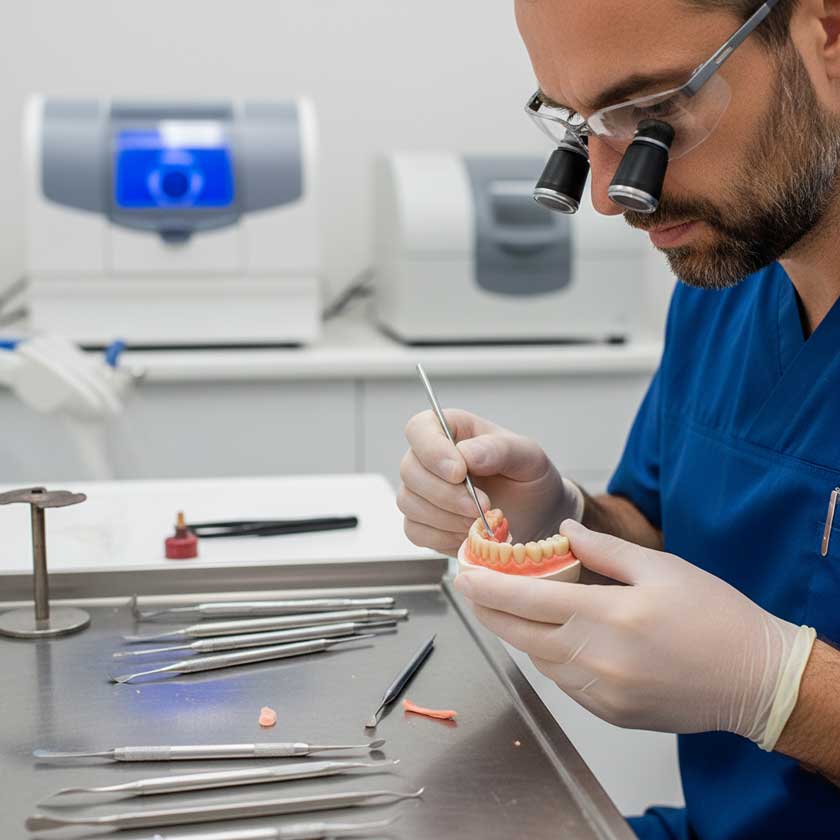Did you know 36 million Americans are missing all their teeth? This statistic underscores the significant role full dentures play in restoring smiles and enhancing quality of life. I'm here to guide you through the full denture process, from the initial consultation to the joy of flaunting your new, complete smile.
We'll delve into every aspect of getting dentures, including the advantages and disadvantages of full dentures, and what to anticipate during dental impressions and tooth removal. Whether you're considering dentures for yourself or a loved one, we'll equip you with the essential information on dental prosthetics today.
Key Takeaways
- Full dentures can restore smiles for the 36 million Americans missing all their teeth
- The denture procedure involves multiple steps, including consultations and fittings
- Dental impressions are crucial for creating well-fitting full dentures
- Tooth extraction may be necessary before getting dentures
- Modern denture materials and techniques offer improved comfort and appearance
- Proper care and maintenance can extend the life of your full dentures
Understanding full dentures: What they are and who needs them.
Full dentures are a common choice for people who have lost all their teeth. I will explain what they are, who needs them, and the various types available.
Definition and purpose of full dentures.
Full dentures are removable teeth replacements for those missing all their teeth. They are made to fit your mouth perfectly and improve your smile. These dental aids help with eating, speaking, and making you feel more confident.
Common reasons for getting full dentures.
Many people get full dentures because of severe tooth decay, gum disease, or injury. Another reason is losing teeth due to age. A dentist will check if full dentures are the right choice for you.
Types of full dentures: Conventional vs. immediate.
There are two main types of full dentures: conventional and immediate. Conventional dentures are made after your teeth are removed and your gums heal. This takes a few months. Immediate dentures are put in right after tooth removal, so you won't be without teeth. But, they need more adjustments as your mouth heals.
Materials for dentures have gotten better over time. Now, dentures use strong, natural-looking materials that look like real teeth and gums. Your dentist will help you pick the best one for you, considering your needs and budget.

The process of getting full dentures.
Getting full dentures is a step-by-step process that requires careful planning and patience. I'll guide you from your first visit to the final fitting.
Your journey to full dentures begins with a comprehensive treatment plan designed by your dentist. They will conduct a thorough examination of your mouth, take x-rays, and discuss the most suitable options for you. Together, you'll select the best type of dentures for your unique needs.
If you still have teeth, they might need to be removed. After that, your dentist could reshape your gums for a better denture fit. This is key for comfort and how well they work.
Then, there's the healing period. Your gums need time to heal before dentures can be fitted. This time varies, usually weeks to a few months, based on how fast you heal.
After healing, your dentist will take impressions of your gums. These are used to make your dentures. You'll also go through bite registration. This is when your dentist checks how your upper and lower jaws line up.
The last step is denture fitting. Your dentist will ensure the dentures fit well and adjust them if needed for comfort and function. It might take some time to get used to your new dentures, but with patience, you'll be smiling confidently again soon.
Materials and technology in modern denture fabrication.
Denture making has changed a lot. Now, we have new materials and ways to make dentures, which make them more comfortable and look real.
Traditional denture materials
Before, dentures were made from acrylic resin or porcelain. These materials were good but had some downsides. Acrylic could stain, and porcelain might chip.
Advancements in denture technology
Dentures are made from strong, comfy materials like high-impact acrylics and flexible nylon. These materials last longer and don't stain as much. Digital impressions make getting dentures faster and more precise.
CAD/CAM and 3D printing in denture manufacturing.
CAD/CAM technology has greatly changed denture making. It lets dentists make dentures that fit perfectly. With 3D printing, dentures can be made to fit even better. These new methods make dentures look and feel real.
- CAD/CAM dentures offer improved fit and comfort
- 3D printing allows for rapid prototyping and production
- Digital workflows reduce the number of patient visits needed
Thanks to these new techs, getting dentures is easier and less painful. The future of denture making looks bright, with more cool innovations coming.

Adapting to life with full dentures.
Getting used to full dentures takes time and patience. Here are some tips to help you adjust smoothly and comfortably.
Eating and speaking with dentures.
Eating with dentures can be difficult at first. Start with soft foods cut into small pieces. Then, slowly add harder foods as you gain confidence.
Practice speaking with dentures by reading aloud or talking to yourself in the mirror. This helps you get used to forming words with your new teeth.
Denture care and maintenance
Maintaining the cleanliness of your dentures is crucial for their longevity and your oral health. It's recommended to clean them daily with a soft brush and mild soap, avoiding harsh cleaners that could damage them. Soaking them in water or a denture solution overnight helps keep them moist and prevents warping.
Soak them in water or a denture solution at night to moisten them. This prevents them from warping.
Dealing with common denture issues
Loose dentures are a common issue. Using denture adhesives can help, but if they keep coming loose, see your dentist for help. They can adjust them for you.
Sometimes, your mouth may get sore as it adjusts. Rinse with salt water to ease the pain. If the soreness doesn't go away, see your dentist. Regular check-ups are important for a good fit and quickly fixing any problems.
Denture adjustments and follow-up care
Getting your dentures is just the start of a new smile. Regular check-ups and adjustments are also important. This keeps your dentures comfortable and working properly.
Denture relining is a common process. It improves the fit of dentures as your mouth changes. As we age, our jawbones can shrink, which can cause problems with fit.
Here's what you can expect at follow-up visits:
- Examination of your mouth and dentures
- Adjustments to improve fit and comfort
- Relining or rebasing of dentures if needed
- Advice on proper care and maintenance
You should see your dentist every six months to a year, depending on your needs. These visits help your dentist find and fix problems early, keeping your dentures working well for a long time.
Your mouth is always changing, and so should your dentures. If you feel any discomfort or notice changes, talk to your dentist right away. Quick action can stop bigger problems later.
Cost considerations and insurance coverage.
Knowing about denture costs and insurance is key when looking into full dentures. Prices can change greatly based on the materials and the dentist's skills. Usually, a full denture set costs between $1,000 and $3,000.
Many dental insurance plans cover dentures partly, about 50% of the cost. Always check with your insurance about what they cover. Some plans might have waiting times or yearly limits that could increase what you pay out-of-pocket.
If you're on a tight budget, consider temporary dentures. They're cheaper and used while waiting for permanent ones. Another choice is implant-supported dentures, which are more stable but cost more.
- Traditional full dentures: $1,000 - $3,000
- Temporary dentures: $300 - $500
- Implant-supported dentures: $5,000 - $30,000
Investing in good dentures can boost your oral health and quality of life. Talk to your dentist about payment plans or financing to make it easier. With the right care, dentures can last for many years, making them a smart choice for your smile and health.
Conclusion
Full dentures can change your smile and boost your confidence. The process might seem hard initially, but it gets easier with care and patience. You'll soon enjoy a new set of pearly whites.
Practicing with denture-friendly foods helps make the transition smoother. Start with soft foods and move to harder ones later. This enables you to get used to eating with dentures. Also, try denture speech exercises to improve your speaking and feel more comfortable.
Remember, getting used to dentures takes time. Your dentist is there to help you every step of the way. Don't be afraid to ask for help or adjustments. With the right care and a positive attitude, dentures will soon feel like part of your smile. You'll be able to eat, speak, and laugh easily.
FAQ
What is the process for getting full dentures?
Getting full dentures starts with an oral exam. Then, treatment planning and tooth extractions, if needed, are performed. Next, impressions of your mouth are taken, followed by a bite registration.
Afterward, you get a wax try-in to check the fit and look. Finally, the dentures are inserted and adjusted for a perfect fit.
What are the different types of full dentures?
There are two main types of full dentures: conventional and immediate dentures. Conventional dentures come after your mouth heals from tooth removal, which takes months. Immediate dentures are made before the tooth removal and put in right after.
What materials are used to make dentures?
Traditional dentures use acrylic resin and porcelain teeth. Newer materials like nylon and flexible resins offer better comfort and stability. CAD/CAM and 3D printing make dentures more precise and tailored to your mouth.
How long does it take to adjust to wearing full dentures?
Adjusting to full dentures takes weeks or even months. It's a process that needs patience and effort. At first, you might face challenges with eating, speaking, and getting used to the dentures.
How can I ensure proper denture care and maintenance?
Clean your dentures daily with a soft-bristled brush and denture cleaner. Rinse them after meals and soak them in water or denture solution at night. Avoid harsh cleaners that can damage the dentures. Regular dental check-ups and cleanings are also key.
How often do dentures need to be replaced or relined?
Dentures may need relining or replacement over time due to mouth changes and bone structure shifts. Relining is usually needed every 2-4 years, and complete replacement might be necessary every 5-10 years, depending on your oral health and denture condition.
Can dental insurance cover dentures?
Many dental insurance plans partially cover full dentures, but coverage varies. Check with your insurance about their denture policies and limits. Some plans may also cover denture repairs or adjustments.








